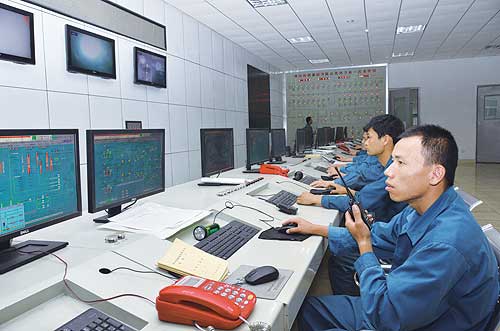Weifang Special Steel Group in the Weifang High-Tech Industrial Development Zone has invested heavily in production waste recycling systems to support its business upgrade and transformation.
The company's steel production volume increased 7 percent year-on-year to 2.8 million metric tons in 2015. Its net profit increased 51 percent year-on-year despite a sluggish market for iron and steel.
Like many steelmakers in China, Weifang Special Steel Group's management team once considered increasing its production capacity and, in 2008, applied to build more blast furnaces.
However, local authorities voted down the expansion plan because they thought it would cause excessive production capacity.
Li Yan, director of the corporate group's management department, said Weifang Special Steel Group faced a difficult situation at that time because it couldn't produce enough smelted iron to fill the demand for special steels.
"We planned to produce 3.9 million metric tons of crude steel annually. However, we were only able to produce 3 million tons because we did not have enough blast furnaces," Li said. "It was a big loss for the group."
Because of that situation, in 2009 Weifang Special Steel Group started to upgrade its products to offset the potential losses caused by its low production capacity. Management decided to focus on producing premium special steel to seize opportunities in the high-end market, Li said.
"The production capacity wasn't high, but the products' added-value was high," Li said. "We also recorded less energy consumption and carbon emissions."
After several years' development and upgrades, the group has successfully attracted some clients from Fortune 500 companies.
Steel production entails high materials consumption, high energy consumption, high waste levels, high environmental protection costs and high operation costs. Those are the key factors that have constrained the development of companies in the past decade, according to the Group.
There are many types of solid waste from steel production, including slag and dust.
"All those wastes can create value," Li said.
He said the group has made many attempts at waste treatment and achieved good economic results.
Slag is used to extract raw materials for steel production, with the resulting residue used to produce cement. The group can produce 2 million tons of slag annually.
Weifang Special Steel Group has an industrial wastewater treatment system that can process 30,000 tons of wastewater daily. The water can be used in making iron and dust reduction after treatment. The company can recycle 14 million cubic meters of wastewater annually, Li said.
In addition to water treatment systems, the company invested 37.1 million yuan ($5.72 million) on desulfurization and 16 million yuan on dust reduction.
The group has built a system to collect exhaust heat from the production process to warm houses in Weifang in the winter. The system heats an area of 500,000 square meters in Weifang.
Yu Guangfu, chairman of the board of Weifang Special Steel Group, said that environmental protection and low energy consumption operation models not only bring economic benefits to companies but also enhance businesses' brand images.
"Environmental protection is a vital social responsibility of a company," he said.
Yu said the group would continue to promote green and sustainable development.
 |
|
Staff members at Weifang Special Steel Group work in an energy optimization monitoring station. |
Yan Shanshan contributed to this story.
To comment or contribute, please e-mail wangqian2@chinadaily.com.cn or call +86-531-58775018.
|